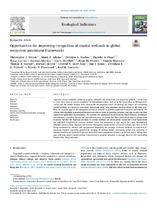| dc.description.abstract | Vegetated coastal wetlands, including seagrass, saltmarsh and mangroves, are threatened globally, yet the need to avert these losses is poorly recognized in international policy, such as in the Convention on Biological Di-versity and the United Nations (UN) Sustainable Development Goals. Identifying the impact of overlooking coastal wetlands in ecosystem assessment frameworks could help prioritize research efforts to fill these gaps. Here, we examine gaps in the recognition of coastal wetlands in globally applicable ecosystem assessments. We address both shortfalls in assessment frameworks when it comes to assessing wetlands, and gaps in data that limit widespread application of assessments. We examine five assessment frameworks that track fisheries, greenhouse gas emissions, ecosystem threats, and ecosystem services. We found that these assessments inform management decisions, but that the functions provided by coastal wetlands are incompletely represented. Most frameworks had sufficient complexity to measure wetland status, but limitations in data meant they were incompletely informed about wetland functions and services. Incomplete representation of coastal wetlands may lead to them being overlooked by research and management. Improving the coverage of coastal wetlands in ecosystem as-sessments requires improving global scale mapping of wetland trends, developing global-scale indicators of wetland function and synthesis to quantitatively link animal population dynamics to wetland trends. Filling these gaps will help ensure coastal wetland conservation is properly informed to manage them for the outstanding benefits they bring humanity. | en_US |

